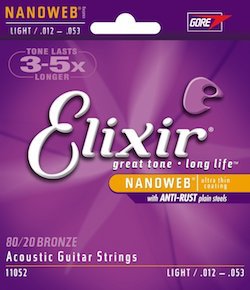How to Buy Acoustic Guitar Strings
If you want to know how to buy acoustic guitar strings, there are a few things you need to consider before you hit the "buy" button or head down to your local music store. You need to consider the materials, gauge, coating, and, of course, price. All of these should be weighed carefully before you make you final choice.
Materials
Some common materials for acoustic guitar strings include bronze (including phosphor bronze and aluminum bronze), brass, copper, hybrid (such as an 80/20 bronze/zinc mix), silk and steel, and polymer construction. Each of these materials has its own tone and feel. As such, string selection is a very personal and style-dependent choice. What works for a bluegrass player may not be a good choice for a fingerstyle guitarist.
It also depends on the type of guitar. Strings that may sound great on a Martin dreadnaught may not work as well on a Gibson parlor-sized guitar. Since strings are relatively inexpensive, the best decision is simply to experiment and find out what works best for you.
Gauge
The string's gauge is another personal component in choosing an acoustic guitar string. Some players prefer lighter gauge strings due to their ease of playability, including easier string bending. The downside to lighter gauge strings is that they go out of tune easier, produce less volume, and are often prone to buzzing on guitars with lower action. Higher gauge strings are more difficult to play but will retain their tune easier, produce higher volume, and generally maintain a better tone. Still, it's a personal preference and some guitars may sound better with lighter gauge strings and vice versa.
A typical light set may run .012 .016 .025 .032 .042 .054 whereas a typical heavy set may run .014 .018 .027 .039 .049 .059.
Playing Style Preferences
The type of music one plays may also dictate the type of strings one chooses. If you're primarily a fingerstyle player, then lighter gauge strings are a good choice, since a lighter touch is often required. If you play bluegrass and primarily strum the guitar, then heavier gauge strings are likely a better choice. Of course, the genre of music will also dictate the materials. Bronze is a common, time-honored choice, due to its clear, bright tone, but they also lose that tone fairly quickly. Fingerstyle guitarists may prefer "silk and steel" strings that have a more mellow tone.
Coated Strings
Some players, myself included, prefer strings that have a coating that preserves the string life. Of course, it's a trade off, in that such strings generally don't sound as vibrant as, say, a fresh, new set of bronze strings. However, unless you like changing strings every week (or more) coated strings (such as Elixirs) can prove to be very useful.
How to Buy Acoustic Guitar Strings - Final Thoughts
Despite "conventional wisdom," you have to find strings that work best for you. There are fingerstyle players who use heavy strings and bluegrass players who use light strings. Experiment and find the solution that works best for you.
Add Your Comments Here!
I'd love for you to be a contributor to SoMuchGuitar.com!
Just fill out the information below to add to this page. I'll be in touch about your submission soon!
